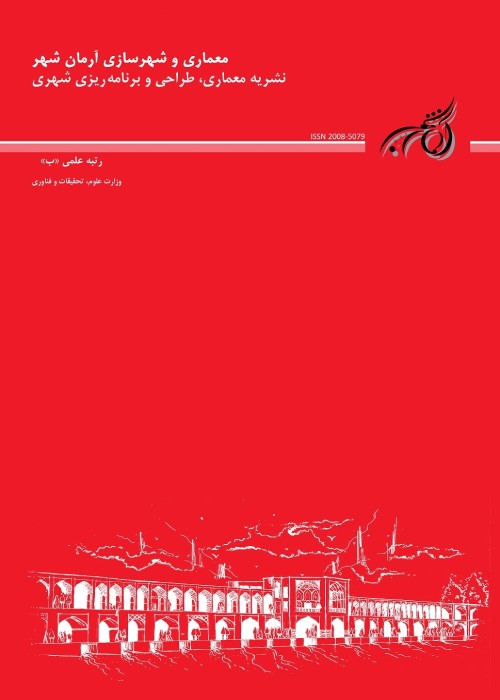Strategic Planning in the Context of Institutionalism, a Theory for Practice
Author(s):
Article Type:
Research/Original Article (دارای رتبه معتبر)
Abstract:
The relations between planning practice and planning theory have been accentuated in recent years, so that planning theory is being assumed as a part of the community today. However, a reliable theory about the nature of planning system in the full sense of the word is still missing. Therefore, regarding the necessity of having a particular national framework, we would need a generic and practical conseptual framework or terminology to explain the planning theory. This article presents an institutional approach to the strategic planning to overcome the separation of planning theory and practice. For this reason, qualitive methodology and espechially content analysis technique has been used. The analytical framework represents how strategic planning theory is used in institutional evolution. Based on qualitative analysis, great attention was paid to the literature on strategic planning and practical experience. Here, the Strategic planning is identified as institutional technology and explained, as such, in its overall capacity to be renewed over time. The territorial focus of strategic planning aims to help actors, in government and in civil society, to work together. This concept explains the planning practice within wider processes of institutionalization, triggered by a social convention. In other word, the notion of institution is adopted in order to understand planning systems as specific social constructs; thus, encompassing the shaping of respective planning cultures. The institutionalist perspective is only the latest of a series of images of planning, which have varied to reflect changes in planning and how it is perceived. The institutionalist perspective shifts the focus from considering planning as an individual or interpersonal activity, to viewing planning as an aspect of governance. This view implies a broader vision of planning and relevant contexts rather than a limited public planning focusing on the state. The writing on new institutionalism in planning dates back to early and mid-1990s. Ernest Alexander, may well be one of the earliest writers among planners on the subject. Alexander’s early foray was accompanied by Patsy Healey, which linked planning theory and institutions. Patsy Healey, a known contributor to the new institutionalism literature situates herself in the broad political economy justification of planning as a form of government intervention that aims to amend the wrongs of unfettered freedom.The planning environment has changed from focusing on government to focusing on governance; the goal of transformation has replaced that of intervention. Healey’s project in this essay is to explain the transformative process and to place the new institutionalism in the context of the transformative goals of planning. One of the main theoretical foundations of institutionalism involves her collaborative approach in the form of a space strategy generation. This approach discusses the planning in relation with changes related to the political, social, cultural features. In other words, the planning theory does not develop in a social, economic and political vacuum, but is formulated by individuals in social situations with the aim of clarifying the enviroment and recommending appropriate procedures and processes. In order to understand the relationship between planning and institutionalization, an analytical framework has been used. At first, the variety of practices generated from the social experience of planning and control activities in an institutional context is considered as a continuous source of evolutionary process. Moreover, successful experiences in particularly affected places and best practices can rise to selective processes of policy transfer. Further selection occurs through a competitive and iterative discourse concerning the overall assessment of territorial governance outcomes within the institutional context. A reduction of discoursces may occur when ‘hegemonic concepts’ are shared or accepted through political acknowledgment in the relevant institutional context, till possible agreement on substantial and / or procedural changes in the planning system structure. Institutional codification is necessary to let the selected changes be commonly adopted in the concerned institutional context, producing widespread application and new network effects. A sort of descending phase in the cycle continues from here, as systematic application of established tools becomes indeed the new operational framework for practices. Strategic planning tools are generally recognized as ‘plans’, although these may be of very different nature, ranging from regulative zoning maps to strategic programs, visions or guidelines. They include, however, further means for governance which are not technically identifiable as plans, such as control devices, monitoring and evaluation procedures and various forms of economic incentive, allowing altogether a wide range of opportunities for practices. Moreover, new problems of spatial organization may emerge over time, inducing the exploration of new solutions from spatial planning, and determining a possible breakthrough for the initiation of a new cycle.
Keywords:
Language:
Persian
Published:
Journal of Architect, Urban Design & Urban Planning, Volume:11 Issue: 25, 2019
Pages:
319 to 328
magiran.com/p1954348
دانلود و مطالعه متن این مقاله با یکی از روشهای زیر امکان پذیر است:
اشتراک شخصی
با عضویت و پرداخت آنلاین حق اشتراک یکساله به مبلغ 1,390,000ريال میتوانید 70 عنوان مطلب دانلود کنید!
اشتراک سازمانی
به کتابخانه دانشگاه یا محل کار خود پیشنهاد کنید تا اشتراک سازمانی این پایگاه را برای دسترسی نامحدود همه کاربران به متن مطالب تهیه نمایند!
توجه!
- حق عضویت دریافتی صرف حمایت از نشریات عضو و نگهداری، تکمیل و توسعه مگیران میشود.
- پرداخت حق اشتراک و دانلود مقالات اجازه بازنشر آن در سایر رسانههای چاپی و دیجیتال را به کاربر نمیدهد.
دسترسی سراسری کاربران دانشگاه پیام نور!
اعضای هیئت علمی و دانشجویان دانشگاه پیام نور در سراسر کشور، در صورت ثبت نام با ایمیل دانشگاهی، تا پایان فروردین ماه 1403 به مقالات سایت دسترسی خواهند داشت!
In order to view content subscription is required
Personal subscription
Subscribe magiran.com for 70 € euros via PayPal and download 70 articles during a year.
Organization subscription
Please contact us to subscribe your university or library for unlimited access!



